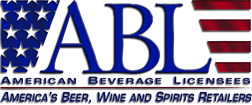Public Safety, Competition and Vibrant Alcohol Marketplace Hang in the Balance
BETHESDA, MD – March 31, 2022 – As the 2022 legislative season continues in state capitals across the country, America’s beer, wine and spirits retailers are alerting state legislators about a growing push to unnecessarily and fundamentally change state-based beverage alcohol markets that are already meeting consumer needs and the public safety standards of communities.
Campaigns to rapidly implement Direct-To-Consumer (DTC) liquor sales – a liquor supplier shipping alcohol that has not gone through a three-tier system of checks and balances, across state lines via common carrier directly to an end user – are becoming more prevalent.
Retail beverage licensees are speaking up to educate and inform their state legislators of the problems that would come with changing these laws and creating a virtually unregulated alcohol market, ripe for dangerous illegal alcohol and counterfeiting, problems that would be poised to grow should global supplier DTC shipping come to pass.
These campaigns are often accompanied by claims that the COVID-19 crisis has made expanded supplier DTC access a necessity. But data show that alcohol suppliers – and liquor manufacturers in particular – have enjoyed record profits and growth for years. Current liquor licensing and sales regulations have not impeded the significant growth of the liquor industry, which has seen supplier gross revenues soar from $18.2 billion in 2007 to $31.2 billion in 2020 and the number of new craft distilleries in the U.S. grow to more than 2,000. That success has been possible because of the very system threatened by supplier DTC sales.
“For the past few years, traditional beverage licensees have seen an increasing push by some alcohol suppliers to subvert existing alcohol sales and distribution systems in order to move sales away from local small beverage businesses,” said John Bodnovich, Executive Director of American Beverage Licensees (ABL).
“These efforts threaten the existence of thousands of brick-and-mortar beverage retailers and the broader American alcohol ecosystem that brings choice and value to consumers. They also jeopardize revenue to businesses and government, and compliance with state laws designed for the commerce of an age-restricted product.”
Liquor manufacturers point to the DTC market for wineries, arguing that its growth has not had a negative impact. To the contrary, what more lawmakers are finding based on reports from state alcohol regulators and other parties is that there are significant problems with illegal wine and alcohol shipping. States are grappling with waves of illegal wine shipments that have spurred at least two states – Michigan and Ohio – to invoke the 21st Amendment Enforcement Act to pursue illegal wine shippers. In Michigan in 2019, more than 2.2 million bottles of alcohol were shipped into the state and of those bottles, 734,365 were shipped illegally.
Brand-building beverage retailers appreciate the enormous responsibility that comes with safely selling and serving alcohol, and the consequences they face should they not do so. Brick-and-mortar beverage alcohol retailers in every state are subject to enforcement action on a regular basis, as well as the threat of fines, closure, and license revocation.
A Cautionary Tale
In Kentucky, following the narrow passage of a highly controversial spirits DTC bill in 2020, the playing field has been tilted significantly against beverage retailers, who are also concerned that average consumers – their customers – are losing out.
Since the law went into effect, beverage retailers in the state have seen a sharp decline in access to in-state bourbon products that their customers rightfully expect them to have in stock. Brick-and-mortar retailers in Kentucky report that the allotment for premium bourbons has decreased as much as 60% in the last year. With suppliers channeling more desirable and profitable products into their own DTC platforms, everyday liquor store customers are being left behind.
Kentucky legislation has also limited the Kentucky Alcoholic Beverage Control Board’s DTC enforcement powers. There remains little, if any, published proof of local taxes being collected on DTC shipments. (In Kentucky, smaller towns collect a regulatory fee to cover the town’s cost to regulate alcohol.) Since there are no carrier reporting laws in Kentucky, it remains unclear if alcohol is being shipped to dry counties and to what extent common carriers are checking IDs.
A Solution in Search of a Problem
As evidenced by the liquor industry’s phenomenal growth in recent years, which should be a benefit to all those in the industry, the lesson from the COVID-19 pandemic is not that state beverage alcohol systems are broken and should be fixed by giving the largest industry firms an anticompetitive advantage through supplier DTC sales.
What the pandemic made clear is that beverage alcohol systems in the U.S. work provided there are enough products to sell, on- and off-premise retailers are allowed to keep their doors open, and enforcement of alcohol laws is applied evenly.
The growth of e-commerce has also underscored what beverage retailers have known for years: scarce enforcement resources for state alcohol beverage control agencies combined with a push by alcohol suppliers for direct-to-consumer alcohol shipping and greater saturation of points of sale is a serious threat to a competitive and safe alcohol marketplace.
“Our message to those faced with a coordinated, national liquor DTC campaign is to examine the totality of your state’s beverage alcohol marketplace and the interests of all stakeholders – including customers but also other local businesses in the beverage alcohol supply chain, revenue collectors, public health and safety officials, alcohol regulators and law enforcement,’” said Bodnovich.
“Beverage retailers who are in their stores or bars everyday continue to adapt and evolve to meet consumers where they are and will fight for a balanced alcohol marketplace that delivers the most diverse range of products; rewards those who are responsible purveyors and stewards to their local communities; and creates profitability for hundreds of thousands of licensed beverage alcohol businesses that support millions of jobs across multiple sectors of the American economy.”
###
